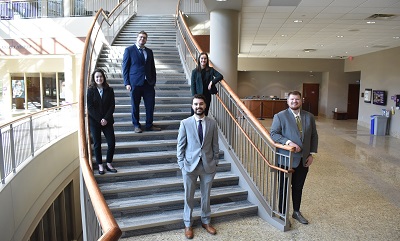By: Sarah Dylag Beznoska, Assistant Dean for Student and Career Services,
Cleveland State University College of Law
2023-2024 was the first year that Cleveland State University College of Law launched our one credit, required-for-graduation professional identity formation (PIF) course for all in-person first-year students. I was the primary instructor and, at the end of the year, it became clear to me that themes of resilience, growth mindset, resourcefulness, and curiosity had emerged from the experience.
Resilience, growth mindset, resourcefulness, and curiosity for the instructor, of course.
As a career advisor and having served in a wide variety of student, academic, and career services roles during the course of my career, I went into 2023-2024 with the assumption that teaching this course would be straightforward. Panel discussions about career paths, small group work about lawyering skills, and one-on-one coaching about values and goals were things I had done repeatedly while working with law students. It did not seem, in my mind, a huge stretch to bring that to the classroom and I thought myself to be something of an expert, ready to share what I knew.
To say that it did not go quite as pictured in my mind is an understatement. My 2023-2024 students spent the year teaching me how to create a more meaningful classroom experience for the next cohort, and for that I am grateful and also humbled.
A few things I learned, which might be obvious to seasoned instructors in the classroom, but which were new to me:
Be as clear as possible from the outset and stick to it!
Make your expectations clear from the start, both in how you open the class and create your community of learners and in the little things, such as how you outline the course on your syllabus or track student progress in the course.
My recollections of the syllabi when I was a law student were that the documents required me to figure out what the assignments were, by reading dense blocks of text in paragraph format. I remember highlighting the syllabi to figure out what I was supposed to be doing, and when.
I thought that the structure and syllabus I created was better than what I had experienced myself. Still, I learned that you can never be too clear and concise when it comes to setting forth expectations and requirements, and repeating them in a variety of ways so that all students in the classroom receive the information. This is a cohort of students who have grown accustomed to using tools like PowerSchool and Google Classroom, where they can always know exactly which assignments are due and when, and where they stand in terms of points/grades.
I want students to learn organizational and project management skills. At the same time, I should not disregard the importance of using the organizational and project management skills myself in presenting the material to them.
Limit the career services panel discussions and give students options
In my experience, traditional career services offerings are built on a model of panel discussions, where experienced attorneys share their own experience and advice, followed by student questions. For a generation of students who have grown up with all of that content available online and who frequently learn better by actively engaging in exercises or activities, these kinds of panels are sometimes painful and repetitive. Worse, even with the most carefully crafted panel, you’re likely leaving someone out – at least one of your students will look at the panel and think “I don’t see anyone like me.”
Some panel discussions are necessary and helpful. However, at a recent Holloran Center workshop, a colleague suggested that I also try giving students a menu of options for meeting certain requirements of the course. She suggested that autonomy has an impact on the student experience and there are a lot of ways to create at least some autonomy within a PIF course.
This makes a lot of sense. We know that students bring wide ranging goals and experiences to the classroom – that’s part of what we’re helping them to incorporate into their law school experience when we are doing PIF work! What one student finds meaningful, another finds unhelpful. Allowing students to tailor their learning to their personal circumstances not only aligns with PIF goals in general, but it also enables students to feel more engaged.
Therefore, try to be strategic about how and when you use a panel. There are a lot of other ways to get your experienced alumni and attorneys involved and to expose students to lawyers. Use alumni as facilitators for small group discussions and exercises, or for informational interview assignments. Create different ways for your students to learn the content, and be creative with student ideas. For example, is there something interesting happening on Instagram Live through one of the national law student networks that you could incorporate? Is there a student organization event that aligns with a course topic that could be helpful?
Be kind to yourself too.
I recently read Katie Arnold’s Brief Flashings in the Phenomenal World, which has nothing to do with lawyering, the law, or PIF, and everything to do with life and living and going on through difficult challenges. She reminded me that what I try to teach my students is what I also need to know myself.
Be kind to yourself, lean into the reasons why you started doing PIF work in the first place, re-assess and try again. With that mindset, I am certain that, if nothing else, year two of my course will be another adventure.
Please feel free to reach out to me at s.beznoska@csuohio.edu if you have any questions or comments.

Sarah Dylag Beznoska is the Assistant Dean for Student and Career Services at Cleveland-Marshall College of Law at Cleveland State University.


